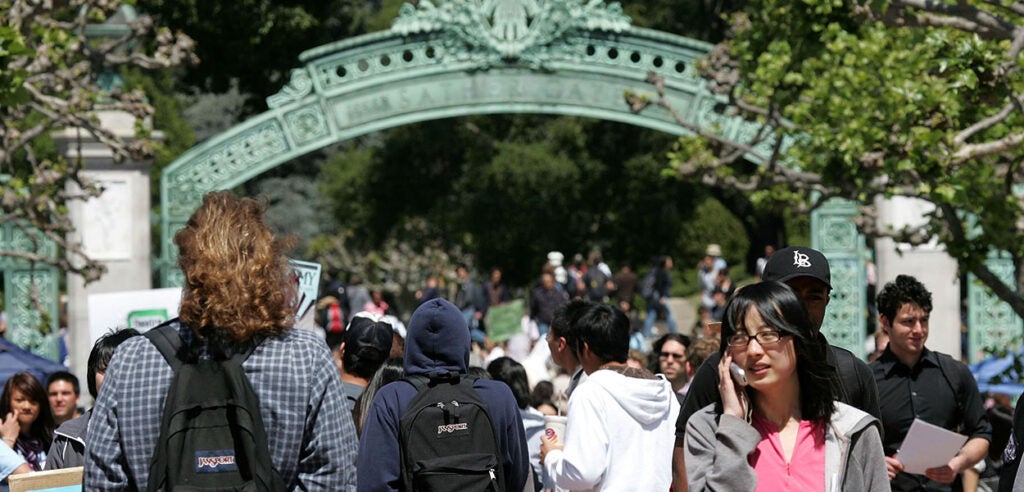College campuses have been dominated by the Left for generations. That’s hardly news to anyone. But a recent news report sheds light on how higher education has been transformed from a general haven of left-wing ideology into an engine of radicalism and revolution in the name of DEI: diversity, equity, and inclusion.
The lengthy report in The New York Times, of all places, highlights how the use of DEI statements essentially has allowed schools to create ideological loyalty oaths for new faculty. These tests aren’t being applied only in humanities departments, they’re the norm in science departments and all others too.
California—upholding its reputation for being at the cutting edge of anti-civilizational lunacy and tyranny—has predictably gone all in on the diversity, equity, and inclusion regime. Fealty to DEI dogma has become practically mandatory at all levels of higher education.
The Times notes that the faculty senate at the University of California, San Francisco urged professors to apply an “anti-oppression and anti-racism” lens to their coursework. On its website, UCLA’s public affairs school pledged to “decolonize the curriculum and pedagogy.” And the faculty senate of California Community Colleges instructed teachers on their duty to “lift the veil of white supremacy” and “colonialism.”
“Professions of fealty to DEI ideology are so ubiquitous as to be meaningless,” Daniel Sargent, a professor of history and public policy at the University of California, Berkeley, told the Times. “We are institutionalizing a performative dishonesty.”
It’s not just that school administrators enforce a pervasive, left-wing culture on campus. That’s been happening for generations. These schools also are hiring with strict DEI-style parameters, to the near total exclusion of merit.
In one study, according to the Times, researchers found that at Berkeley “a faculty committee rejected 75% of applicants in life sciences and environmental sciences and management purely on diversity statements.”
It seems this may have been a racial test too. From the Times’ report:
Latino candidates constituted 13% of applicants and 59% of finalists. Asian and Asian-American applicants constituted 26% of applicants and 19% of finalists. Fifty-four percent of applicants were white and 14% made it to the final stage. Black candidates made up 3% of applicants and 9% of finalists.
That makes sense, given what’s in the diversity statements. Many schools, including Berkeley, publicly post their standards online. Among the answers that will produce a low score is saying that you will “treat everyone the same.”
To get the highest scores, you need to be explicitly racial in thinking and demonstrate that you’ve not only participated in or will participate in campus DEI programs but will be actively leading new initiatives.
What’s clear is that these schools aren’t focused simply on weeding out conservatives. People anywhere vaguely on the Right clearly don’t have a ghost of a chance of getting through the application process. No, these schools are about finding active, devoted leaders of social justice causes.
If you aren’t a DEI revolutionary, schools don’t want you to teach about science or engineering or anything else at their institution.
Remember, when the Left says “believe the science,” what it’s really saying is “believe the left-wing activist with institutional backing next to his/her/zir name.”
Unfortunately, what started in California didn’t stay in California, as many schools around the country copied the Golden State model.
Among the methods schools use to promote DEI goals is what John Sailer, a fellow at the National Association of Scholars, called “cluster hiring.” Universities hire applicants in bulk, using DEI statements to weed out most unwanted applicants.
Sailer noted how in 2021, Vanderbilt University’s Department of Psychology undertook a cluster hire that “eliminated approximately 85% of its candidates based solely on diversity statements.”
The federal government exacerbates this problem.
“The National Institutes of Health (NIH) has allocated $241 million in grant money for cluster hires at universities around the country—with the condition that every search committee must require and heavily weigh diversity statements,” Sailer wrote.
The DEI racket is a national phenomenon, but this bleak environment includes signs that change may be coming.
It seems that some school systems are reconsidering their DEI litmus tests. For instance, Georgia’s public university system eliminated DEI requirements in July. It put out a statement saying that hiring decisions should be “free of ideological tests, affirmations, and oaths.”
I’d like to ascribe this change to a genuine change of heart, but it’s telling that this policy shift came right after the Supreme Court’s ruling that racial preferences in college admissions are unlawful.
It goes to show how much of a game-changer that decision is. Schools now have reason to be concerned about lawsuits from applicants claiming discrimination.
Creating ideological litmus tests that appear to discriminate and actually tell faculty that not discriminating is bad surely won’t help the cause of colleges and universities.
This small retreat won’t exactly fix what ails higher education in America, but it does represent an opening for a recalibration.
Larger change will happen when more schools return to a classical learning model and jettison the DEI regime altogether. That seems unlikely to happen without outside pressure.
But outside pressure is building as institutional trust declines. If more states reject the California model, a genuine new birth of freedom in education may not be so far-fetched as it seemed just a few years ago.
Have an opinion about this article? To sound off, please email letters@DailySignal.com, and we’ll consider publishing your edited remarks in our regular “We Hear You” feature. Remember to include the URL or headline of the article plus your name and town and/or state.
